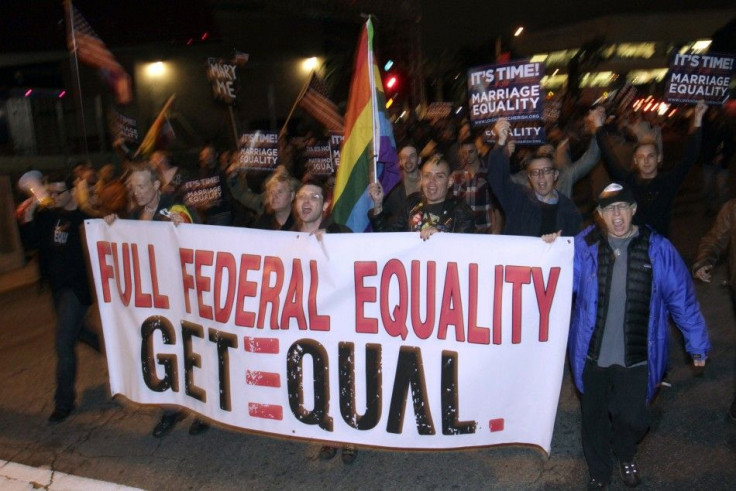Is DOMA Doomed? Federal Judge Calls Anti-Gay Marriage Law Unconstitutional

A federal judge has ruled that a law barring the U.S. from recognizing legal same-sex marriages is unconstitutional, bringing the 1996 Defense of Marriage Act closer to being heard before the U.S. Supreme Court.
U.S. District Judge Jeffrey White in California said DOMA had to be reviewed with a high level scrutiny given the historical discrimination of gays and lesbians, finding that there is no justification for denying federal benefits to a lawfully married couple because they are gay.
The ruling came a year after the Obama administration announced that its lawyers will no longer defend the constitutionality of DOMA, though the law would still be enforced. The case was brought by a federal appeals court employee who wanted to put her wife on her insurance plan.
White, an appointee of President George W. Bush, rejected DOMA supporters' arguments that Congress needed to define traditional marriage in federal law, removing a socially divisive issue.
The Court finds the contention similar to arguments that were advanced in support of antimiscegenation laws, White wrote. This court finds that Congress cannot, like an ostrich, merely bury its head in the sand and wait for danger to pass, especially at the risk of permitting continued constitutional injury upon legally married couples.
White is the second federal judge to rule DOMA, which allowed Congress for the first time to define marriage, unconstitutional. A federal judge in Massachusetts in 2010 also struck down the law. His ruling also came on the heals of the Ninth Circuit Court of Appeals throwing out Prop 8, the California voter-approved consitutional amendment revoking same-sex marriage in the state.
With an appeal of White's Wednesday ruling expected, cases challenging DOMA will be making their way through the appellate courts, giving the Supreme Court a chance to review the 1996 law signed by President Bill Clinton.
Since then, DOMA has been an appealing target for the LGBT community and same-sex marriage advocates as more states allow gay couples to wed like any heterosexual couple. Further, the law's opponents received a boost after the Obama administration dropped its defense of the law, leaving the Republican-led House of Representatives to create its own group to pick up the legal defense.
No Justification for DOMA
White based his ruling on Congress' justification for enacting DOMA. Much of the Congressional record is steeped in the idea that allowing same-sex marriage would demean the institution.
The ruling references comments from conservatives such as the Sen. Jesse Helms and Rep. Henry Hyde, while quoting liberally a House report on the law. The report reflected lawmakers' moral disapproval of homosexuality and moral conviction that heterosexuality better comports with traditional morality.
The government interests that would protected by DOMA included encouraging child procreation and rearing, defending the institution of heterosexual marriage and traditional ideas about morality, and conserving government resources by withholding benefits.
But White said DOMA accomplishes none of this. For instance, he says denying federal benefits to same-sex couples does nothing to promote childrearing and actually harms children of legally married gay couples.
On the issue of maintaining consistency in the definition of marriage as states gradually open marriage to same-sex couples, White said DOMA actually creates administrative confusion because the U.S. has simply relied on states' definition of marriage to decide who should receive federal benefits.
Beyond benefits, White rejected the idea that a moral condemnation of homosexuality could be a legitimate reason for creating a law like DOMA. He concluded the facts of the case required DOMA to be declared unconstitutional, regardless of the fact that the group targeted was gay men and women.
He pointed to a comment Chief Justice John Roberts made at his confirmation hearing about judges being like umpires, for they don't make the rules... it's [the judge's] job to call balls and strikes.
Basing legislation on moral disapproval of same-sex couples does not pass any level of scrutiny, White said. The imposition of subjective moral believes of a majority upon a minority cannot provide a justification for the legislation.
--
© Copyright IBTimes 2024. All rights reserved.




















